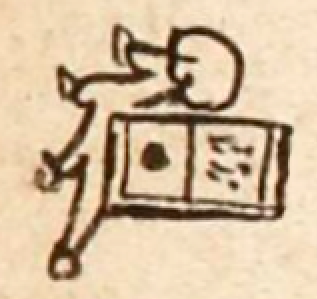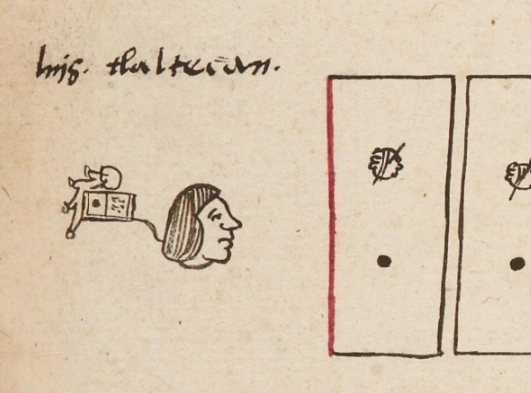Tlalteca (Verg19r)
This black-line drawing of the compound glyph for the personal name Tlalteca (perhaps “People of the Land” or "People of Tlallan," attested here as a man’s name) shows a bird's eye view of a rectangular parcel of land (tlalli) with two segments, one with a black dot in the middle and the other with small dots (suggesting cultivation?). The parcels have a division in the middle and a border along the bottom and the sides, but not the top. At the middle of the top of the rectangle is a part of a face that emphasizes lips (tentli), providing a phonetic syllable "-te-," which, when combined with the flow of water (atl), can come close to "-tecatl." The lips face toward the viewer's left, and almost springing from the mouth are has four short streams, each one ending in a droplet or bead.
Stephanie Wood
This glyph is remarkably like the compound for Tlaltecatl (below). The dots on the parcel segment on the right seems to suggest cultivation. The one larger, round, black dot in the tlalli segment on the left is unclear. It looks something like olli (a rubber ball). The water and lips are phonetic indicators, and the land parcel provide a logogram.
The man with this name may have been named for the famous lord Tlatecatzin, who was, according to numerous sources, a poet/singer born in the fourteenth century in what is now a part of Puebla that was dominated by the Chichimecs of Tetzcoco. Tlaltecatzin was a predecessor of Nezahualcoyotl.
Stephanie Wood
luis. tlaltecan
Luis Tlalteca
Stephanie Wood
1539
Jeff Haskett-Wood
land, tierras, parcelas, agricultura, agua, piedra, parcels, terrenos, labios

tlal(li), land parcel, https://nahuatl.wired-humanities.org/content/tlalli
tlallan, in or under the ground, or perhaps a place name, https://nahuatl.wired-humanities.org/content/tlallan
-teca(tl), (affiliation suffix), https://nahuatl.wired-humanities.org/content/tecatl
Persona de la Tierra (?)
Stephanie Wood
Codex Vergara, folio 19r, https://gallica.bnf.fr/ark:/12148/btv1b84528032/f45.item.zoom
The non-commercial reuse of images from the Bibliothèque nationale de France is free as long as the user is in compliance with the legislation in force and provides the citation: “Source gallica.bnf.fr / Bibliothèque nationale de France” or “Source gallica.bnf.fr / BnF.” We would also appreciate a citation to the Visual Lexicon of Aztec Hieroglyphs, https://aztecglyphs.wired-humanities.org/.







